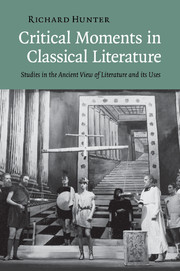Book contents
- Frontmatter
- Contents
- Acknowledgements
- List of abbreviations
- Introduction
- 1 Aristophanes' Frogs and the critical tradition
- 2 Readings of Homer: Euripides' Cyclops
- 3 Comic moments
- 4 The ugly peasant and the naked virgins: Dionysius of Halicarnassus, On Imitation
- 5 The grand and the less grand: ‘Longinus’, On the Sublime
- 6 Reading for life: Plutarch, ‘How the young man should study poetry’
- Bibliography
- Index of passages discussed
- General index
6 - Reading for life: Plutarch, ‘How the young man should study poetry’
Published online by Cambridge University Press: 03 May 2010
- Frontmatter
- Contents
- Acknowledgements
- List of abbreviations
- Introduction
- 1 Aristophanes' Frogs and the critical tradition
- 2 Readings of Homer: Euripides' Cyclops
- 3 Comic moments
- 4 The ugly peasant and the naked virgins: Dionysius of Halicarnassus, On Imitation
- 5 The grand and the less grand: ‘Longinus’, On the Sublime
- 6 Reading for life: Plutarch, ‘How the young man should study poetry’
- Bibliography
- Index of passages discussed
- General index
Summary
POETRY AND EDUCATION
‘What is poetry for?’ is the insistent question which the Frogs bequeathed to the Greek critical tradition. Plutarch's treatise ‘How the young man should study poetry’ offers a clear answer: for the seriously minded young man and his father, poetry is an introduction to philosophy, particularly ethical philosophy. There are, of course, other ways to read poetry – the ‘lovers of stories’ (ϕιλόμυθοι) may prefer to pay attention to the stories which poetry offers or the ‘scholars’ (ϕιλόλογοι) to ‘the beauty and arrangement of the words’ – (30d–e) but Plutarch's concern is, and ours should be, no less than paideia. The reading of poetry is a stage on a journey, a sea voyage in fact (15d, 37b), and the goal of the journey is an adult engagement with philosophy; as such it is to be distinguished from the ‘philology’ of the grammarians, concerned with glosses and etymologies, a study which has its own pleasures (22c–d, cf. 31e–f), but offers no practical benefits in ‘real life’.
At the conclusion of the work Plutarch expresses this process of initiation into the Mysteries of philosophy through a rewriting of Plato's famous image of mortals as prisoners in a cave (Republic 7.514a–18b), from which the philosopher alone may escape into the sunlit world of intelligible truths above; for Plutarch, as for Plato (see Rep. 7.514a2, 518b–c), what is at stake here is indeed paideia. Poetry can serve to help our eyes prepare for the full dazzle of philosophy:
[Philosophical readings of poetry] open and stimulate the young man's mind to what philosophy has to say.[…]
- Type
- Chapter
- Information
- Critical Moments in Classical LiteratureStudies in the Ancient View of Literature and its Uses, pp. 169 - 201Publisher: Cambridge University PressPrint publication year: 2009

